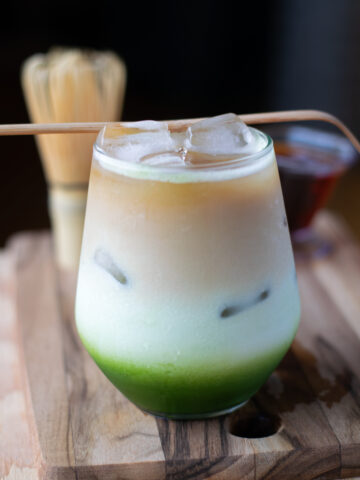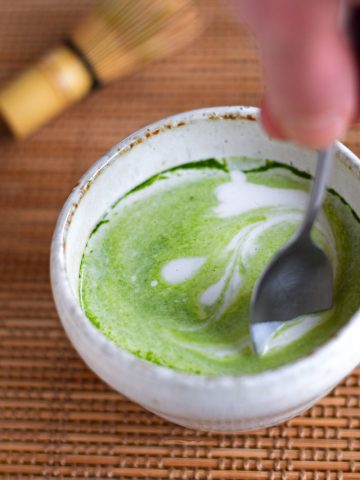This cozy homemade yuja tea is made with fragrant yuzu and raw honey, with no refined sugar. Naturally caffeine-free and deeply comforting, it’s my go-to bedtime ritual when winter settles in here in Japan.
In both Korea and Japan, it’s long been sipped during cold and flu season. Bonus tip: wear your comfiest pajamas.
Jump to Recipe
There was a time when I dreaded going to bed.
Not because I wasn’t tired—
but because I knew I wouldn’t be able to fall asleep.
My anxiety about work the next day was so intense, my mind wouldn’t shut off. I’d lie awake for hours, tossing and turning. Some nights, I’d get up and take a shot of Nyquil just to knock myself out and catch a few hours of rest.
I read one self-help book after another, desperate to quiet my racing thoughts. I even tried a tip from one of Tim Ferriss’s books: honey mixed with vinegar as a natural sleep remedy. At that point, I was willing to try just about anything.
These days, I’ve stopped chasing magic potions.
Yuzu cha isn’t one either.
But it is a ritual.
Making a warm mug of yuzu cha—also known as yuja cha—has become one of those simple nighttime habits that helps me slow down and feel held.
The rising steam. The citrusy aroma of yuzu peel. The warmth in my hands.
All of it sends a quiet message to my nervous system:
You’re safe.
You can let go now.
Relax.
In a world that’s always rushing, stirring a cup of citron tea feels like the antidote.
Not a miracle cure.
Just a small act of remembering how to breathe.
Jump to:
- What is Yuja Tea (also called Citron Tea or Yuzu Cha)?
- Why You’ll Love This Recipe
- Ingredients
- Where to Buy Yuzu
- How to Make Yuzu Tea from Scratch
- Health Benefits of Yuzu Tea
- Frequently Asked Questions
- More delicious Japan-inspired drinks
- Korean Honey Citron Tea Recipe (Yuja Cha)
- Homemade Citron Tea (Yuzu / Yuja Cha)
What is Yuja Tea (also called Citron Tea or Yuzu Cha)?
If you’ve watched Korean dramas on Netflix, you might’ve seen someone sipping a steaming cup of golden citrus tea, with tender strips of peel gently floating inside.
Yuja tea is a traditional Korean remedy made by mixing thinly sliced yuja fruit (a type of citrus) with sugar or honey to make a thick marmalade. A spoonful is stirred into hot water to create a soothing, caffeine-free tea.
Though it originated in Korea, where it's called yuja cha (유자차), it’s also enjoyed in Japan, where it’s known as yuzu cha (柚子茶).
In my homemade Japanese version, I use only honey. It’s less sugary than store-bought and gentle on the throat in the colder months.
Like other herbal teas, citron tea doesn’t contain any tea leaves, so it’s naturally caffeine-free.
Store-Bought Yuja/Yuzu Tea
In Japan, you’ll often find jars of imported yuzu cha from Korea on supermarket shelves. These jars contain a marmalade-like preserve called yuja-cheong, made by mixing yuja peel and pulp with sugar or honey.
To make the tea, you just stir a spoonful into hot water.
While convenient, I prefer making my own using organic yuzu and 100% local honey, with no refined sugar or additives. It’s simple, satisfying, and gives me more control over what goes into each cup.
For me, it’s the closest I can get to a moment of nature here in Tokyo—warmed up in a mug and ready to soothe the soul.

Why You’ll Love This Recipe
Made with real fruit and local honey
No refined sugar, no additives—just wholesome, natural ingredients you can feel good about.
Soothing and caffeine-free
Perfect for winding down, especially in the colder months or before bed.
Easy to make at home
All it takes is a jar of homemade yuja marmalade and some hot water. That’s it.
A cozy connection to nature
Even in the middle of the city, this tea brings calm with every sip.

Ingredients
Note: Full recipe card is below.
- 5–6 medium-sized yuzu fruit
- Honey
- Hot water
What is Yuzu?
Yuzu is a knobbly-skinned citrus fruit originally from China, now widely grown in Korea and Japan. It may look like a bumpy, rough-skinned lemon, but the scent will stop you in your tracks.
Tart like grapefruit, sweet like mandarin, and intensely aromatic, yuzu is the secret behind the deeply soothing flavor of yuja tea.
In late autumn, my eyes are always peeled for organic yuzu at the farmer's market in Tokyo.

Where to Buy Yuzu
In Japan
Right now, it’s December in Japan—peak yuzu season.
I picked up a bag of slightly imperfect organic yuzu for about $2 at the U.N. Farmers Market in Tokyo. Most vendors were selling them for around $1.50 (200 yen) each.
You’ll find yuzu at farmers markets, local supermarkets, and produce stands from late autumn to early winter—typically November through January.
In the United States
California is the heart of yuzu farming in the U.S.
Many small growers cultivate it, and it’s especially popular with high-end chefs like Michelin-starred Thomas Keller.
Outside of California, your best bet is:
- Japanese or Korean grocery stores (like Mitsuwa, Nijiya Market, Marukai, or H Mart)
- Online specialty retailers (search “buy fresh yuzu online”)
- Asking chefs at upscale Japanese restaurants if they can recommend a source
If you’re not near a major city like L.A., San Francisco, or New York, fresh yuzu may be harder to find—and more expensive.
In Australia
Yuzu is grown in small quantities in Australia.
According to an SBS Food article, the season runs from February to July, depending on the region.
Some growers offer limited shipping, so it’s worth contacting them directly.
In the UK and New Zealand
You might get lucky!
From what I’ve read, some people have found fresh yuzu at specialty Asian markets or through online importers in both the UK and New Zealand. Availability tends to vary by season, so check in late autumn or winter and call ahead if possible.
Can You Grow Your Own Yuzu?
Yes, but it’s a long game.
If you plant a yuzu tree in your backyard, don’t expect fruit for the first 8 to 10 years.
That will definitely teach you patience.

Yuzu Substitute: What to Use When You Don’t Have Yuzu
Fresh yuzu can be hard to find outside of Japan and Korea. And when you do spot them at a specialty grocery store or farmer’s market, they can be surprisingly expensive.
But don’t worry, you have options:
Option 1: Move to Japan or South Korea. (Tempting, right?)
Option 2: Buy bottled yuzu tea (yuzu cha in Japanese, yuja-cha / 유자차 in Korean) or yuzu marmalade online. These are often the same product—a fragrant citrus preserve that can be mixed with hot water for tea. It’s not quite the same as fresh yuzu, but it’s tasty, aromatic, and convenient.
Option 3: Substitute with other citrus.
The closest flavor match is Meyer lemon, with its floral, slightly sweet aroma. Regular lemons work too, though the flavor won’t be as complex or fragrant. You can also experiment with a blend of lemon and a touch of orange or grapefruit zest to mimic yuzu’s unique brightness.
Tip: If you’re using marmalade or store-bought yuzu tea, check the label. Some are loaded with sugar or additives. Look for versions with minimal ingredients if you’re aiming for a healthier option.

How to Make Yuzu Tea from Scratch
Once I realized how easy it is to make homemade yuzu tea (yuzu cha), I stopped buying it and started using fresh citron from the farmer’s market.
Here’s how to make it:
- Juice the yuzu, then thinly slice the leftover peel. (Removing the seeds is optional.)
- Mix the sliced peel, juice, and any leftover pulp with an equal amount of honey.
- Spoon the mixture into a sterilized jar, screw on the lid, and let it sit at room temperature for 24 hours.
- Store it in the fridge. In 3–4 days, you’ll have fragrant, homemade yuzu marmalade.
To serve: Stir 2–3 spoonfuls into hot water for a soothing, vitamin C–rich cup of yuzu tea.

Health Benefits of Yuzu Tea
In Japan and Korea, this cozy, citrusy drink is a popular cold-weather remedy. Made by mixing yuzu peel and pulp with honey, then dissolving it into hot water, yuzu tea is comforting on chilly days. And it may also offer several science-backed health benefits.
What Is Yuzu Tea Good For?
Traditionally enjoyed during the winter months, yuzu tea is often used to help soothe sore throats and coughs. It’s rich in vitamin C and other antioxidants, which may support the immune system and help the body recover from seasonal illnesses. The warm water and honey also make it naturally calming and gentle on the throat.
Yuzu Nutrition & Antioxidants
Yuzu fruit is a citrus powerhouse packed with:
- Vitamin C – Essential for immune function, skin health, and collagen production.
- Limonene – A compound concentrated in the peel, which may help reduce inflammation and fight oxidative stress.
- Other antioxidants – Found in the peel, seeds, and juice, which may help protect cells from free radical damage.
Tip: To get the full benefits, use as much of the fruit as possible, especially the peel. Just remove the bitter white pith and the stem. If you can, choose organically grown yuzu to avoid pesticide residue, especially since you’ll be consuming the peel.
Stress Relief & Aromatherapy Benefits
Yuzu isn’t just nutritious, it’s also fragrant. The bright, floral scent of yuzu peel has been shown in studies to reduce stress and improve mood. In fact, yuzu essential oil is commonly used in aromatherapy for its calming effects.
When making yuzu tea at home, take a moment to breathe in the steam from your cup. That uplifting aroma? It’s nature’s anti-stress remedy.
Immune System Support
Thanks to its high vitamin C content and antioxidant-rich profile, yuzu may help:
- Strengthen your immune system
- Support the body’s defenses during cold season
- Reduce inflammation linked to chronic conditions
Some research also suggests that compounds in yuzu may support cardiovascular and brain health by reducing oxidative stress and improving circulation.
Benefits of Raw Honey in Yuzu Tea
The honey used to preserve yuzu and prepare the tea adds more than just sweetness:
- Natural cough soother – Warm honey coats the throat and may ease irritation.
- Promotes relaxation – Some people find that a spoonful of honey before bed helps them sleep better.
- May reduce allergies – Taking raw local honey before allergy season may help your body adapt to local pollen and reduce symptoms over time.
(Always consult your doctor first.)
Final Tips for Maximum Benefits
- Use raw, unfiltered honey when possible.
- Avoid overly processed yuzu tea products with added sugar or preservatives.
- Keep the seeds, use the peel, and skip the bitter white pith.
Disclaimer
This article is for informational purposes only and is not intended to diagnose, treat, or cure any medical condition. Please consult a healthcare professional before making any changes to your diet or health routine.

Frequently Asked Questions
Yes, citron tea is the same as yuzu cha (or yuzu tea).
English = citron
Japanese = yuzu
Korean = yuja
It’s the same citrus fruit, just with different names depending on the language.
Imagine drinking a warm honey-lemon tea with bits of citrus peel. But the flavor isn’t exactly lemon — it’s softer and more layered. You might sip it and think, “I’ve never tasted anything like this before.”
Yuzu (citron) has notes of lemon, grapefruit, and mandarin orange. It’s milder than other citrus fruits and more floral, especially when paired with honey. The aroma is sweet, citrusy, and deeply comforting. It's one of my favorite smells in Japan!
Yes, citron tea (often called yuzu tea) originated in Korea, where it’s known as yuja-cha (유자차). In Japanese, it’s called yuzu cha. Same idea, just different languages and culinary traditions.
Yes, both are made from preserved citrus fruit and enjoyed as a tea. Yuja is the Korean name, yuzu is the Japanese name, but they refer to the same type of fruit.
Some people say Korean-grown yuja has a thicker peel and a stronger fragrance. I’d love to confirm that myself on a future trip to Korea.
It’s traditionally used to soothe sore throats and coughs, especially in Korea and Japan. Many also enjoy it as a calming drink to unwind after a long day. It may support immunity or digestion, thanks to the vitamin C. But honestly, I drink it because it’s comforting and delicious.
Scoop 1–2 tablespoons of citron marmalade into a mug, add hot water, stir, and enjoy.
You can also:
-Mix it with cold water and ice for a summer drink
-Add it to yogurt or ice cream as a fruity topping
-Use it in cocktails
-Spoon it over shaved ice
It’s incredibly versatile and delicious.
No, citron tea doesn’t contain any tea leaves, so it’s completely caffeine-free. It’s a great option if you’re sensitive to caffeine or want something calming to drink in the evening.
Yes, you can enjoy yuzu tea iced. It’s just as refreshing cold as it is warm. To make iced yuzu tea, stir a spoonful or two of your homemade yuzu marmalade into cold water, then pour over ice. For deeper flavor, you can chill it after brewing with hot water. Try mixing it with sparkling water or adding citrus juice or herbs for a refreshing yuzu mocktail. It’s an easy, caffeine-free drink for summer or hot climates.
Photo: iced yuzu tea with chanh muio (salted pickled lime) @saigon.social
More delicious Japan-inspired drinks
Did you try this recipe? Tag @eyesandhour on Instagram and leave a ⭐️⭐️⭐️⭐️⭐️ rating & comment below!
Have you tried yuzu tea before? Let me know in the comments!
Korean Honey Citron Tea Recipe (Yuja Cha)
This easy Korean honey citron tea recipe (also called yuja cha or yuzu cha) is warming, soothing, and naturally sweet.

Homemade Citron Tea (Yuzu / Yuja Cha)
Ingredients
- 5-6 yuzu fruit medium size
- honey
To Make Citron Tea
- hot water
Instructions
Prep
- Wash whole yuzu thoroughly with water.
- Scrub yuzu peels with course salt.(optional)
- Remove any brown spots or scars in the peels with a knife.
- Slice yuzu into quarters, vertically, from stem to bottom tip.
- Trim off the pith.*
- Squeeze out juice and pulp into a small bowl. Set aside.
- Remove seeds with a knife or spoon.(optional)
- Remove stem ends with a knife.
- With peels facing down on a cutting board, slice peels julienne-style. Set aside.
- Remove pulp from the bowl and squeeze out the juice with your hands.
- Blend pulp in a blender or chop into small pieces with a knife. Set aside.
Combining the Ingredients
- Using chopsticks or a fork, add slices of yuzu to a sterilized jar to make one layer of yuzu peels.*
- Cover the layer of yuzu peel with honey.
- Repeat steps 1 and 2 until you've added all of the yuzu peel to the jar.
- Add all the yuzu juice and chopped pulp to the jar.
- Stir with a spoon.
- Tightly seal lid on the jar.
- Leave the jar out in a cool, dry place for one day.
- After a day, open the jar and mix with a spoon.
- Reseal the jar with the lid and keep in the refrigerator for 3-4 days.
Making citron tea
- Add one tablespoon of yuzu/honey mixture to hot water or black tea.
- Stir and serve warm.









Esper Baldonado says
Hi,
Just start drinking the yuza tea I bought a big jar from Korean supermarket. I first saw it on the Korean drama I was watching called “YUMI Cell”. I am now addicted to it and drink it every night, I mix it with hot water before bedtime. It tasted so good, it give the sweetness if you grave sweet at the same time without adding calories 🙂
I am originally from the Philippines and I love watching Korean Drama. My hubby said my I should be born Korean.. Actually lots of Korean living in out country specially near where I was born part of Central Luzon. I am now living in San Antonio Texas, moved to the US when I married my husband 32 years ago….
Matt says
Hi Esper. thank you for taking the time to leave a comment! That's great that you can find some yuzu cha in Texas. Especially when it starts to get cold at night, I find it relaxing to drink before bed.
Sun says
Healhy and lovely recipes. Thank you so much for your recipes.
Susana says
Hello! I just made this and was wondering how long it would last in the fridge. If it doesn't last long, can I freeze a portion of it? Thank you!
Matt says
Hi Susana, Thank you for leaving a 5 star review! As long as you sterilize the jar properly, it should easily last a month or two in the fridge. I've never needed to freeze it but it should be ok to go in the freezer. Honey won't exactly freeze because of the low water content but it should work. Initially, I'd recommend just keeping it in the fridge. If you are in the northern hemisphere, it should last you through the winter. And I hope you love it! It's my favorite before bed.